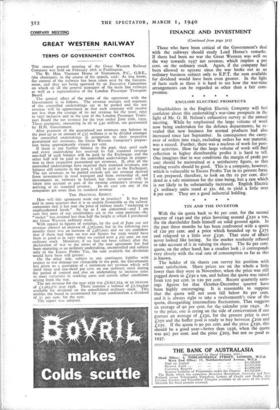COMPANY MEETING
GREAT WESTERN RAILWAY
TERMS OF GOVERNMENT CONTROL
THE annual general meeting of the Great Western Railway Company was held on February 28th at Paddington. The Rt. Hon. Viscount Horne of Slamannan, P.C., G.B.E., (the chairman), in the course of his speech, said: As you know, the control of the railways has been taken over by the Govern- ment, and they are being operated by an Executive Committee on which sit all the general managers of the main line railways as well as a representative of the London Passenger Transport Board.
The general effect of the terms of the agreement with the Government is as follows. The revenue receipts and expenses of the controlled undertakings are to be pooled and the net revenue will be apportioned so that each company will receive not less than the average of its net revenue for the years 1935 to 1937 inclusive and in the case of the London Passenger Trans- port I3oatd the net revenue for the year ended June 30th, 1939. These payments, amounting in all to k4o million, are guaranteed by H.M. Government.
After payment of the guaranteed net revenues any balance in the pool up to an amount of £3} millions is to be divided amongst the controlled undertakings in proportion to their respective guaranteed net revenues, the Great Western Company's propor- tion being approximately sixteen per cent.
If there is any further balance in the pool, then until each and every undertaking has received its full standard revenue one-half of such balance will be paid to the Exchequer and the other half will be paid to the controlled undertakings in propor- tion to their respective guaranteed net revenues. If, after all the controlled undertakings have received their standard revenues, any balance still remains in the pool, it will be paid to the Exchequer. The net revenues to be pooled exclude any net revenue derived from investments in road transport and from ownership of, and investments in, railways in Ireland, but these revenues will be taken into account as part of the owning company's revenue in arriving at its standard revenue. In no case can any of the companies get more than its standard revenue.
THE PRACTICAL EFFECT.
How will this agreement work out in practice? It has been said in some quarters that it is so unduly favourable to the railway companies that it has sent the price of railway stocks " rocketing to unprecedented leyels." So far as I am concerned—and I am sure that most of our stockholders are in the same position—the " rocket " has attained less than half the height at which I purchased my Great Western ordinary stock. With regard to figures of earnings, by the end of June our net revenue showed an increase of L383,000, but in the following two months there was an increase of L487,000; and we are confident that if there had been no war our figures for 1939 would have been as good as in 1937 when we earned over 4 per cent. on our ordinary stock. Moreover, if we had not been subject after the declaration of war to the terms of the new agreement but had been operating as an ordinary undertaking, uncontrolled and subject only to the Excess Profits Tax, the sum available for dividends would have been still greater.
On the other side, subject to any contingent liability with respect to war damage not chargeable to the pool, the Government has given us a guarantee of a minimum net revenue which will yield three and one-third per cent. on our ordinary stock during the period of control and also an undertaking to increase rates to meet variations in working costs and certain other conditions arising from the war.
The net revenue for the year 1939 was £6,6o7,324, or an increase of £1,563,571 over 1938. There remains a balance of £1,704,640 available for dividend on the consolidated ordinary stock. This enables the board to recommend for your confirmation a dividend of 3- per cent. for the year.
The report was adopted.














































 Previous page
Previous page